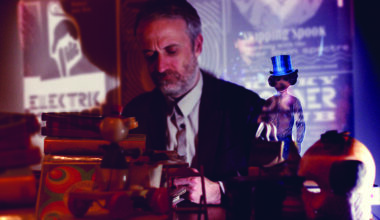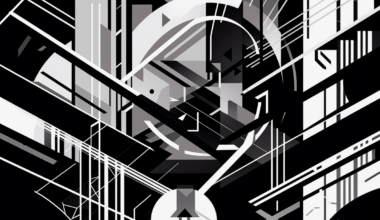Electronic psychonauts Gnod operate out of Islington Mill, a Grade II listed Victorian cotton mill in Salford that has somehow escaped the gentrification tidal wave and now houses a vibrant community of musicians, labels, artists, designers, photographers and printers. Gnod’s charismatic lynchpin Paddy Shine takes us on a tour of the unique building at the epicentre of a creative revolution
From Dylan being decried as “Judas!” at the Free Trade Hall to that famous band-spawning Sex Pistols gig at the same spot a decade later, to Tony Wilson’s Factory imprint and Hacienda nightclub and all the pills, thrills, bellyaches and voodoo rays that followed, Manchester is a city that has always had plenty going on musically.
A stone’s throw away in Salford sits Islington Mill, a ramshackle slice of Victorian Britain surrounded by 1970s tower blocks, humdrum utilitarian retail ephemera and dereliction. It’s home to a remarkable co-operative of industrious, free-thinking, creative trialblazers who are fast turning the place into the beating heart of a new, post-austerity counter-cultural scene.
From the outside, there’s little to indicate what goes on beyond the mill’s rusting iron gates. But pass through into the verdant cobbled courtyard and you’d be forgiven for thinking you’d found a nifty space/time shortcut to a Berlin or Amsterdam bohemia.
We’ve been told to ask for Paddy Shine, frontman of post-kraut, part-kosmische, free jazz-inflected electronic psychonauts Gnod, the band that much revolves around at the mill. We’re reliably informed that he’s the peer-appointed spokesperson for the wider goings on here. It’s immediately clear to see why, such is the warmth of his energetic Irish-Mancunian welcome.
“Ah, it’s great to meet you at last,” he says dropping the gear he is midway through shifting in preparation for tonight’s gig at the mill to greet us with handshakes. “We’ve all been looking forward to this.”
The show he’s preparing for will see Gnod playing support to LA garage-psych outfit White Hills, who are opening their European tour here.
“Have a seat in the courtyard while I sort these cables out and I’ll grab you a drink – tea, coffee? Or a beer maybe, to grease the wheels a bit?”
Five minutes later, we’re sitting outside supping tea in the spring sunshine. Above our heads, kestrels and jackdaws are squabbling over the prime nesting spots up in the mill’s inaccessible tower. Paddy wastes no time putting out the word that we’re here and we settle in for an afternoon of discovery with the musicians, label owners, artists, designers, printers and other creative visionaries who are currently working out of Islington Mill – both in its vast communal rehearsal spaces and also in its more intimate, light-filled private studios and workshops.
Fiercely independent and nurturing, risk-taking and experimental, this is one hell of an inspiring place. It’s quite some achievement for the self-deprecating owner, Bill Campbell, who is clearly intensely proud of the achievements of so many of the people based here and the impact that the environment of the mill has had on them. If Bill has a style of leadership, it comes with such a lightness of touch that it’s close on invisible.
“People often don’t know how or why the project exists, but they are always glad that it does,” he offers. When I ask Bill to sum up the credo and raison for his singular dream of forming a community of artists and musicians around the shared goal of living and working as freely and creatively as possible, he simply says, “In the main, I just like partying”. As do the rest of this hardworking, hard-playing bunch, as becomes apparent once tools are downed for the day, the ale bottle tops start popping, and the excitement builds in anticipation of the White Hills gig.
While this is by no means a definitive guide to all the movers and doers of Islington Mill, these are some of the figures that the estimable Paddy Shine introduces us to during our memorable sojourn into the heart of the other city…
A Brief History Of Islington Mill
Islington Mill was built in 1823 for Nathan Gough, an entrepreneur who started out at the age of 10 as a cotton spinner, before becoming a manager at his brother’s cotton mill and eventually going on to manage a mill of his own. Gough later became famous as an engineer, inventing a portable steam-powered engine, which he used to ride around the streets of Manchester at speeds of up to seven miles an hour, as well as a variety of other labour-saving devices.

Islington Mill was hit by tragedy shortly after it was first opened, when the upper floor collapsed, killing 19 workers. After the accident, the original cast-iron beams were replaced by safer timber ones. The mill thrived throughout the 19th century and by 1891 was in the hands of HW Lee & Co, a cotton doubling firm. In 1996, the building (along with its engine and boiler houses, warehouses, stables and courtyard) was declared to be of special historic interest and granted a Grade II listing.
Islington Mill Reborn
The idea for an artistic community at Islington Mill has been a good while in the making. Founded in 2000 by self-funded creative visionary Bill Campbell, it’s seen a number of phases in its tentatively organic, proudly DIY and often seat-of-its-pants development.
After studying design at Central Saint Martins in London in the 1990s, Bill moved to Salford, living in one of the tower block flats opposite the mill. Noticing a small “For Rent” sign in a window of the 19th century wreck that he thought had lain empty for more than 30 years, he made a half-hearted enquiry about a studio space and ended up renting a whole floor, which first had to be cleared of hundreds of decaying old typewriter reels. Once established, he was energised by the possibilities.
“I felt it was a great privilege to be in a building with such an incredible sense of freedom,” he says, sitting at the mill’s huge communal dining table, the centrepiece of which is a large, ornate gothic candlestick holder. “I just thought that everyone who wanted it should have the same opportunity.”
Bill explains that the IRA bomb that caused so much devastation in central Manchester in 1996 proved to be an accidental catalyst for the urban living phenomenon to take hold in the area.
“Creative co-ops just weren’t happening at that time,” he recalls. “Old buildings were being snapped up by developers and turned into ridiculously expensive flats that only corporate professionals could afford. So I contacted the city council and the Arts Council with a proposition to turn the mill into a not-for-profit arts space, but unfortunately they turned it down.”
Bill then began to investigate the possibility of buying the mill with a bridging finance loan. To his complete surprise, he was offered a short term solution.
“But that meant I had to answer to business and it always felt precarious,” he says. “Artists started coming in to do installations, but there was too much uncertainty about what was happening here. By 2004, against my better instincts, I came close to selling up to the developers, but then I got a cold call from one of the big banks asking if I needed a mortgage. So I said yes!”
Getting in on the easy credit boom before the global financial crash gave the mill the stability it needed just at the point of the dying dream. Now there’s a morality tale that few of us would have expected to hear.

Since then, Islington Mill has grown from its initial visual arts focus to being as well known for its Gnod-led electronic music experiments as it is for its internationally recognised artist residencies. Bill Campbell puts much of this down to the energies of his close associates Rivca Burns, Emma Thompson, and visual artists Maurice and Mark Carlin, who have been pivotal in putting the mill at the centre of the annual May Day Sounds From The Other City festival, which celebrates Manchester’s new music and arts scene.
Now the building hosts workshops galore (including screenprinting and one where you can build your own synth), thriving club nights like Gesamtkunstwerks, vital gigs (as well as White Hills, other recent shows include Moon Duo and Tim Shaw & Sébastien Piquenal) and cutting-edge exhibitions and installations. And it’s as counter-culturally non-commercial as ever.
Callum Higgins and John Powell-Jones
Close associates Callum Higgins and John Powell-Jones are Teessiders and typify the ego-free collaborative ethos that seems to drive so much of what goes on at Islington Mill. They run the Sacred Tapes label, Callum overseeing all the imprint’s design work while John takes care of the printing. They are also both musicians, recording together as Swaggerjack and individually under their own names as well as a variety of aliases depending on the musical aesthetic. Check out the layered field recordings and founds sounds Callum brings together using his Yes Blythe moniker and John’s sackcloth-hooded hypnotic psych outfit Horrid. The number of alternate identities that are operative here can feel a little disorienting at times, but the deeper you dig into the vastness of the mill’s musical output, the more it starts to make sense.
John Powell-Jones first came to Salford pretty much on a whim, attracted by the closeness of the music and the art that’s created at the mill. He has a thriving design and print studio on the first floor, where he works for a host of other labels besides Sacred Tapes, including Opal Tapes and Black Opal. He’s currently working on the sleeve for Peter Hook’s forthcoming album, although he remains tight-lipped about his brief.
“Gnod are the driving force here, there’s no two ways about it,” says John when we ask what keeps the musical momentum up at Islington. “The guiding hands of Paddy Shine and Chris Haslam are inspiring. It’s such a natural and unforced set-up. Everyone’s on the same wavelength and you wouldn’t believe what a like-minded and co-operative community there is.”
“There’s this ‘never say no’ ethos that means everyone’s constantly up for trying new stuff,” adds Callum. “There are no parameters and you’re always encouraged to make things happen for yourself, because there’s always someone who can help you. And if you don’t know them, there’s always someone else who does and will point you in the right direction.”
Does it ever get a bit competitive?
“Absolutely not,” answers Callum. “The only sense of that is in maintaining the high standards that everyone sets – musically and aesthetically.”
“Line-ups and formations often tend to share common band members, so it happens naturally,” offers John. “And then there’s the city itself, with its dark industrial edges, which can influence a lot of the sounds that people make. When Chris [Haslam] brought Sam Weaver [half of London electronic outfit Hungry Ghost and master of the modular analogue keyboard] to the mill, all of the synth stuff started to happen here, which gave everything a new impetus.”
Michael Holland
The warmly ebullient Michael Holland runs the Ono label with a well-tuned ear for under-the-radar, immersive ambience and an astonishingly keen eye for design aesthetics. He has a reputation as one of Manchester’s most enthusiastic and genuine music collectors and sharers. He also works with Paddy Shine at the Ono Tesla imprint and he’s full of praise for his colleagues and associates.
“Islington Mill is about creating a safe place for people to experiment and feel free,” says Michael. “If you want to do something but you don’t know how to do it, there’s always someone around who can help you. The place itself holds the scene together and somehow there’s always good news – people are always being offered new gigs, tours, exhibitions, so nobody ever feels like they need to move down to London.”
Among his most prized recent releases on Ono Records is Watch Repair’s ‘Stopped Clock Chimes’, a deeply captivating piece that compares favourably with the work of Eno, Sasumu Hirasawa and the best of experimental minimalism. We’re treated to an excerpt in Michael’s sunlight-drenched upper floor workspace that looks out beyond Salford’s industrial landscape towards the Pennines. Even spending a short amount of time here is sufficient to get a handle on his work ethic and its singular expression – which is very much worthy of your full attention.
David Mclean
Sometime Gnod saxophonist David McLean encapsulates the dynamic cross-pollination that keeps things fresh and interesting here. Originally from Buckinghamshire, he moved to Manchester in 2008 after hearing about Islington Mill through friends who had come to Manchester to attend university.
“The accessibility of the music scene here seemed amazing to me, so I just had to come up,” he enthuses. “When I played at the mill as a solo musician, Callum [Higgins] was one of the first people to support me and that then opened my eyes to the wider spirit of help and encouragement that’s all around.”
David is closely involved with Sacred Tapes, but he also runs the improv-led cassette imprint Tombed Visions. Right now, he’s preparing for releases by Colin Fisher and Ricardo Lagomasino, followed by a piece from Sam Andreae.
“A few of the guys at the mill are into improv, but the recordings we make always revolve around a melodic centre,” he explains. “Colin and Richard are two incredible talents, a very melodic pairing of tenor sax and drums bouncing off each other. Sam has taken the sax and rather than do straightforward solo stuff, he’s turned it into an almost percussive instrument – harsh, rhythmic and very different.”
In the words of Paddy Shine, one of David’s many talents is his “finely tuned ear for crazy shit”. Paddy feels Tombed Visions has been releasing some of the most interesting sounds coming out of the mill in the last couple of years. His personal favourites include Aufklärung, I Have Eaten The City and Ex-Easter Island Head, artists that span a range of genres from cold as ice post-punk, jazz, uplifting ambience and beyond.
Jamie Robinson
Photographer and visual artist Jamie Robinson’s workspace is dominated by an impressive display of vintage cameras, some of which are pre-war and immediately catch the eye of our own snapper Alex. Another one from the north east, Robinson moved to Manchester in 2007 to work at the stunning neo-gothic John Rylands library, where he still works part-time. He does the press shots for Samarbeta and live visuals for the Gesamtkunstwerks club nights, as well as shooting the bands that perform at the mill. He’s also just finished the new video for ‘Breaking The Hex’, a track on Gnod’s ‘Infinity Machines’ album, a surreal quasi-horror experience featuring sheep brains.
“What I love about working here is that everyone is involved with everyone else,” says Jamie. “It’s just so collaborative, so you get the chance to work with people that you otherwise wouldn’t. There’s this platform for ideas that helps you think bigger. And I’ll tell you something else, there’s not a single person here that’s in it for the money.”
Samarbeta
Rivca Burns and Emma Thompson run the Music Residency Program at Islington Mill under the name Samarbeta. The first residence was Charles Hayward of This Heat in May 2014, followed by Swaggerjack in January 2015. The outcome of each residency could be anything from a simple live show or a new work to a unique collaboration or the discovery of a new instrument – and all points in between. Charles Hayward released ‘Anonymous Bash’ on a limited edition 180-gram vinyl as part of his stint, while the one recording of the Swaggerjack piece resides in the British Library, where only library members can hear it. The latest addition to the program sees selected members of the BBC Philharmonic Orchestra, who are based just around the corner from the mill in MediaCityUK, working with Liverpool-based trio Ex-Easter Island Head.
The Record Labels
Islington Mill is awash with independent record labels releasing a frankly bewildering array of artists. Refreshingly, hoovering up their inventive output for free on sites like Bandcamp and Soundcloud isn’t on the cards for many of the imprints. Instead, and call them old fashioned if you like, you have to actually buy their lovingly produced physical releases to hear the music held within. And what a treat much of it is. From gentle ambient to full-blown noise, here’s a very rough guide…
Tesla Tapes
Owner: Paddy Shine
Artists: Druss, Lightning Glove, Dwellings, Yes Blythe, Exquisite Corpse, Michael O’Neill, Negra Branca, Black Tempest, Raikes Parade, Barton Moss, Ripit, Radical Zoo, Machine Woman, Stress Waves, Ahrkh
Run by the Gnod frontman both as an outlet for the eclectically-experimental solo and side projects of Gnod and Islington-associated musicians such as Michael O’Neill, Callum Higgins and Marlene Ribeiro (her melodic-sombre pop rooted dreamscapes as Negra Branca are a real highlight), as well as a showcase for associated bands based away from the mill, both local, national and international
Sacred Tapes
Owner: Callum Higgins, ably assisted by John Powell-Jones
Artists: Paul Wolinski, Callum Higgins, John Powell-Jones, Swaggerjack
Short-run releases that cover collaborations, side projects, live recordings and spin-offs of bands and musicians that make up Manchester’s noise scene
ONO
Owner: Michael Holland
Artists: Watch Repair, Marty McKenna & Michael Holland, Weaver Holland Duo, Andrew Hargreaves, White Dot, Bitter Minnow, Lewis Robert Jones, Solar Powered Buddha, Stress Waves
Experimental ambient music and found sounds
Tombed Visions
Owner: David McLean
Artists: Circuit Breaker, Cornered Yet Climbing, Joseph Lawrence Quimby Jnr, Aufklärung, I Have Eaten The City, Ageing, School House, The Duke Of Zuke
Eclectic improv label ranging from post-punk to experimental jazz to uplifting ambient
ONO Tesla
Owners: Paddy Shine and Michael Holland
Artists: Gnod, Negra Branca, Raikes Parade, Lightning Glove, Exquisite Corpse, Dwellings, Run Dust, Druss, Nighthammer, Michael O’Neil, Black Tempest, Machine Woman, Barton Moss, Famous Moon King, Live Low
OnoTesla is a collaborative imprint bringing together Michael Holland’s Ono label and Paddy Shine’s Tesla Tapes. “When it came opening an online store to represent all the labels at the mill, it made sense to call it OnoTesla to keep everything under the same umbrella,” explains Paddy.
Little Crackd Rabbit
Owner: David Armes
Artists: BLK w/ BEAR, PJ Philipson, ARC Soundtracks, Black Walls, Hypnodrone Ensemble
Outsider offshoot of Manchester’s Little Red Rabbit Records specialising in darkly ambient, improvisational and experimental works. Each release comes with a beautiful hand-printed sleeve and the label offers a subscription option featuring four (or thereabouts) releases a year issued in a handmade box by book artist Gemma Lacey
Moderate Twat Kissa
Owner: Mark Jermyn
Artist: Dub Vampire
The first release, Dub Vampire’s ‘Lying Motherfucker’, is a seven-inch single in a striking hand-printed gatefold sleeve. “All politicians are lying motherfuckers, so we thought that the best thing to do was to screen print their dirty faces on the sleeve,” declares Mark Jermyn. Paddy Shine says Mark is one of the hardest working artists at the mill.
Gnod’s ‘Infinity Machines’ album is out on Rocket Recordings.
For more about Islington Mill, visit www.islingtonmill.com






